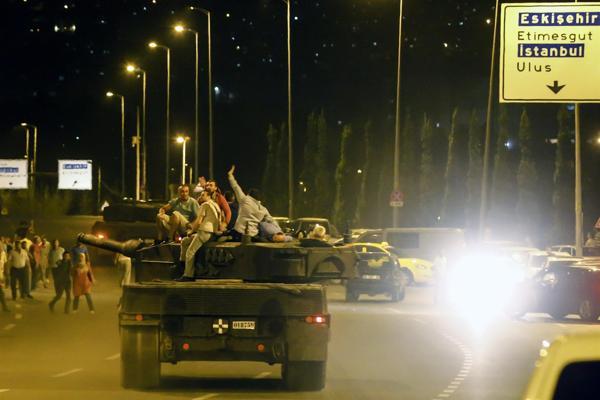July 15 coup attempt and the democracy prestige of the West: Op-ed
Volkan Bozkır


One of the most important factors that keep confidence alive between countries is the support and solidarity at times of crisis one nation receives from others. This support is provided sometimes through morale and sometimes via material mediums. For instance, humanitarian aid is dispatched to a country which has been hit by a natural disaster. At times, even if the disaster-hit country may not really need it, aid is sent to this nation: This is a symbolic effort to show solidarity.
This tradition is important for rapprochement among the nations. The main purpose here is to improve humanitarian ties not only to strengthen inter-state relations. In a way, this is a public diplomacy and PR effort targeting the citizens of both the disaster-hit country and the nation that provides aid. As might be recalled, then-U.S. President Bill Clinton’s visit in the wake of the 1999 Gölcük earthquake had a huge impact. The “Earthquake Diplomacy” almost ended tensions between Turkey and Greece.
Just like natural disasters, nations sometimes suffer from political disasters. Past experiences show that providing support at the times of natural disasters is much easier than political disasters. Nevertheless, how international actors respond to or what positions they take in political disasters is important because unlike natural disasters it is possible to change the course of political disasters.
The course of the political disaster Turkey experienced on July 15, 2016 could have been changed. On that day, FETÖ-affiliated soldiers attempted a bloody coup to topple Turkey’s democratically-elected government and its president. They even aimed at killing the president. People lost their lives on the streets resisting coup plotters. A real crime was committed. This crime needed to be recognized, to be declared unlawful, unethical, condemned and its victims needed to be supported. At that point, support from Turkey’s western allies was crucial. However, this support would come with a long delay and when it arrived it was too late and much more different than what was expected.
Turkey’s Western allies did not show any reaction to the political disaster in a country which is a candidate for European Union membership, member of the United Nations and NATO until the struggle was over and it became clear that the coup plotters were defeated.
On the night of July 15, statements made by then-U.S. Secretary of State John Kerry and some EU officials indicated that the U.S. and the EU knew what was going on in Turkey only a few hours after the coup attempt was launched. However, neither the U.S government nor EU officials took a definite stance.
Ambiguous statements from the U.S and EU member states almost encouraged coup plotters who intensified their attacks.
The statements in support of Turkey and its democratically-elected government came four hours after the coup attempt was launched when it became clear that the plotters were on the brink of defeat. Civilian targets were attacked from the air following statements from the U.S. The parliament building was bombed by the plotters.
Strongly-worded statements against the coup attempt came only after the putsch was totally aborted. Particularly the EU developed a rather strange position in the wake of July 15 on Turkey’s legitimate self-defense against the coup attempt and the measures it took.
EU officials voiced concern over the declaration of emergency rule in a country which overcame a political disaster with heavy casualties. The U.S. voiced concern over the detentions of military personnel.
In the eyes of the Turkish people, the West is the cradle of democracy and the west should have admired such a victory for democracy. However, soon it emerged that it was not the case.
Western countries failed in public diplomacy.
The Turkish public’s confidence in the U.S and EU eroded because of the EU and U.S.’s stance on the extradition of soldiers involved in the coup and the extradition of Gülen.
In sum, on July 15, Turkey had a political disaster, inflicted heavy wounds but overcame this disaster. The struggle by the military, police force, parliament, the government, and civilians against the coup attempt showed that Turkey was not a failed state.
During and in the aftermath of this disaster, the people of Turkey did not see sincere support and solidarity from the West, which failed in crisis management.
If Turkey’s Western allies had shown support and solidarity, the course of the events could have been very different and that could have brought Turkey much closer to the West. More important, such a stance could repair the West’s prestige in democracy that has eroded over the years.
It could not be known how Turkey’s Western allies would have acted if the coup attempt had succeeded. It could be said, however, the lack of support and solidarity during and after the disaster contributed greatly to the Turkish peoples’ negative perception of the Western friends.
Volkan Bozkır is the chair of the Turkish Parliament's Foreign Affairs Committee
